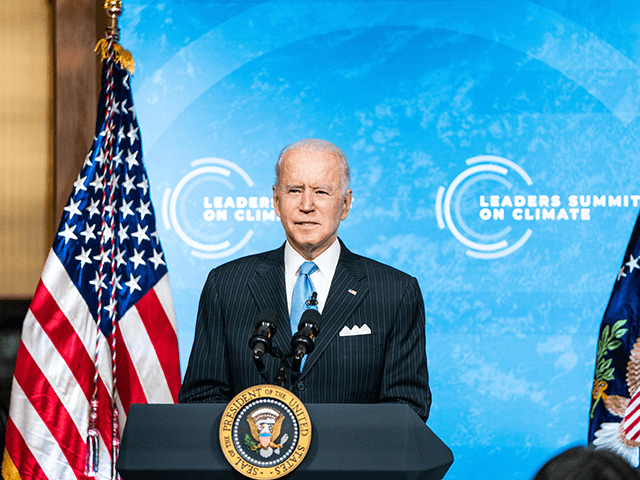The Biden administration is prepared to lift some sanctions on Iran if it resumes compliance with the 2015 nuclear deal, including some Trump-era restrictions over terrorist activities and human rights violations allegedly imposed disingenuously to make it difficult to return to the agreement, the U.S. State Department asserted this week.
Ned Price, a spokesperson for the State Department, told reporters Thursday if Iran recommits to the nuclear deal, the U.S. “will need to lift” some of the sanctions reinstated and added by the Trump administration after it pulled out of the pact in 2018.
Breitbart News reported early this month that China, one of the nuclear deal signatories, has taken the lead in pressuring President Joe Biden to rejoin the pact and remove sanctions on Iran.
Price’s comments came a day after Iran launched a missile attack from Syria on Israel that the Israeli military said failed to hit its intended target, the country’s top-secret nuclear reactor.
In response, Israel struck targets in Syria, home to Iranian troops and proxies.
Consistent with the position of Sunni Gulf Arab states wary of Shiite Iran’s aggressiveness in the Middle East, Israel has accused Iran of trying to develop nuclear weapons. Israel has also come out against the Biden administration’s efforts to revive the 2015 nuclear deal.
U.S. allies in the Middle East, namely Israel and Gulf Arab states, celebrated when former President Donald Trump pulled out of the 2015 pact. Israel and Saudi Arabia consider Iran to be their arch enemy.
Asked by Associated Press (AP) reporter Matt Lee on Thursday to provide one example of what the Biden folks categorize as a sanction “disingenuously or improperly imposed” on Iran by the Trump administration to make it difficult to revive the nuclear deal, Price refused to do so.
Price said the category covers sanctions that are “inconsistent” with the 2015 nuclear agreement, formally known as the Joint Comprehensive Plan of Action (JCPOA), without elaborating further on what that means.
“If we get back to that point [of compliance by Iran], we will need to lift sanctions that are inconsistent with the deal,” Price told reporters.
“There are sanctions that are consistent with the JCPOA,” he added, without explaining what those are.
Lee repeatedly pressed Price for an example of what the Biden administration considers sanctions disingenuously imposed by its predecessor, but the spokesperson danced around the question.
“The reason I am hesitant to do that [provide the example] is because you are asking me to pre-judge what may happen with the [ongoing discussions],” Price ultimately conceded.
The Biden administration is engaged in indirect negotiations taking place in Vienna on reviving the nuclear agreement.
According to an anonymous official who spoke to reporters Wednesday, there is not yet any sanctions relief pact between Iran, the U.S., or the other signatories to the original deal.
The AP’s reporter’s question about the allegedly improper Trump-era sanctions stemmed from what that official told reporters.
The unnamed official revealed the U.S. has shared with Iran three categories of sanctions it is willing to lift in exchange for its return to compliance with the nuclear deal.
AP reported Wednesday:
The official said the U.S. through intermediaries has presented Iran with three baskets of sanctions: those it’s prepared to lift, those it’s not prepared to lift, and those that will require further study to determine if they are in fact appropriate for relief under the nuclear deal. The official briefed reporters on condition of anonymity because of the confidential nature of the discussions.
The official declined to specify which sanctions fall into which baskets but said the third group is the most problematic. That’s because it includes measures that current officials believe may have been imposed by the previous administration simply to complicate any potential return to the deal that former President Donald Trump withdrew from in 2018.
…
While the agreement allowed countries to continue to impose sanctions on Iran for non-nuclear reasons, such as support for terrorism and human rights abuses, some of the additional U.S. sanctions would have to be removed if Washington is to return to the deal, according to the official.
The official said the Trump administration had designated some nuclear sanctions as terrorism sanctions. That makes it more difficult for a future president to return to the deal.
In 2015, the nuclear deal gave Iran, the U.S.-designated top state sponsor of terrorism globally, billions of dollars in sanctions relief for curbs on its nuclear program.
That relief disappeared when Trump pulled out of the agreement in 2018 and began a self-styled “maximum pressure campaign” against Iran by reinstating the nuclear sanctions originally put in place by the Obama-Biden administration and adding new ones.
The Trump administration imposed new sanctions punishing the Islamic Republic for supporting terrorism and committing human rights violations. Still, many of the Trump-era sanctions on Iran are related to the nuclear program.

COMMENTS
Please let us know if you're having issues with commenting.